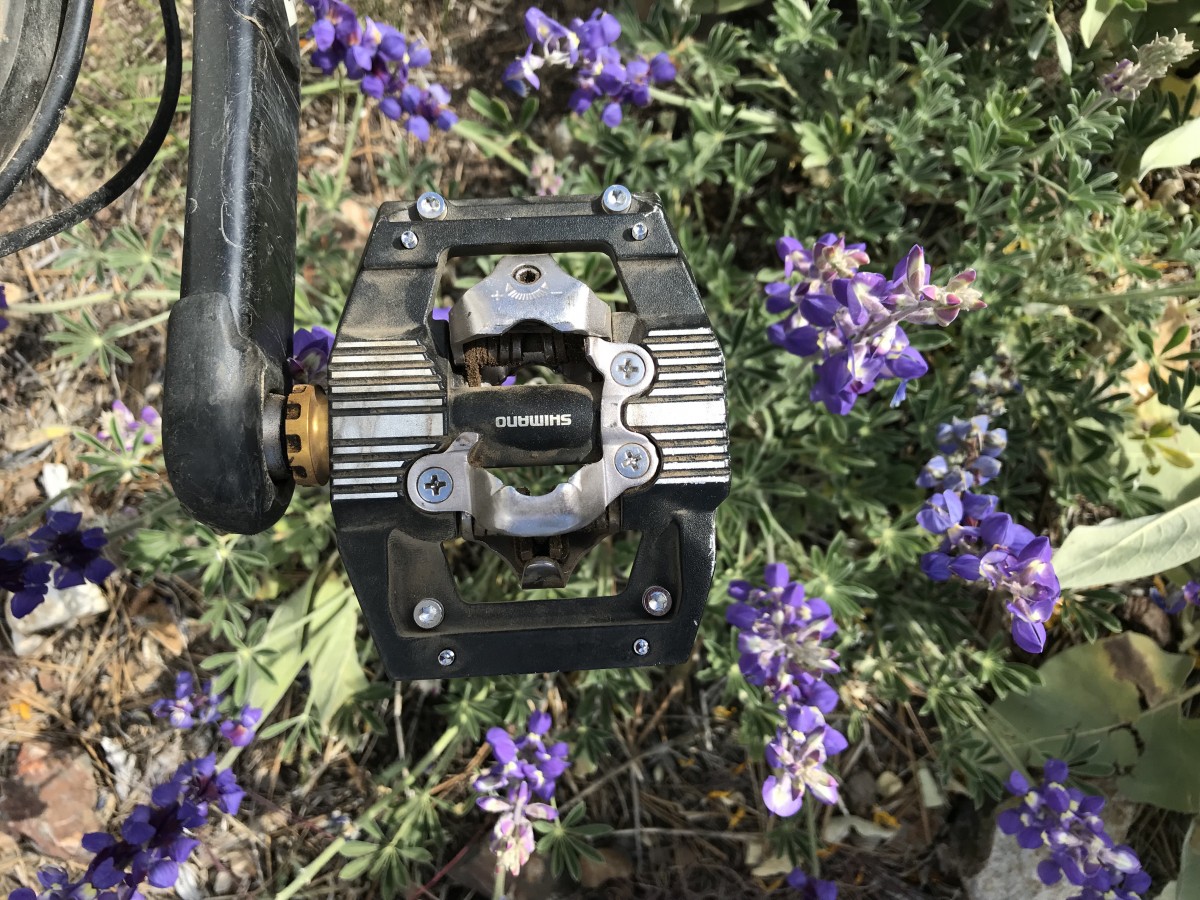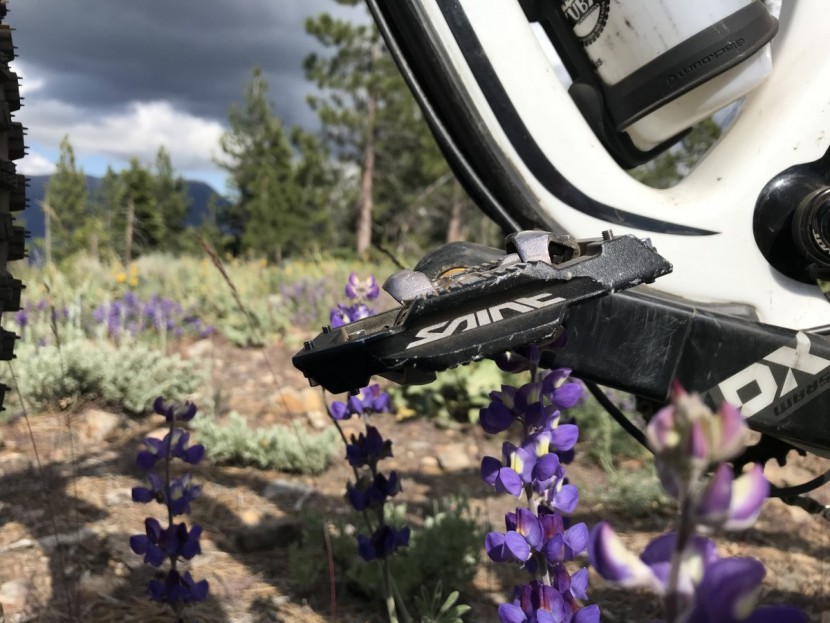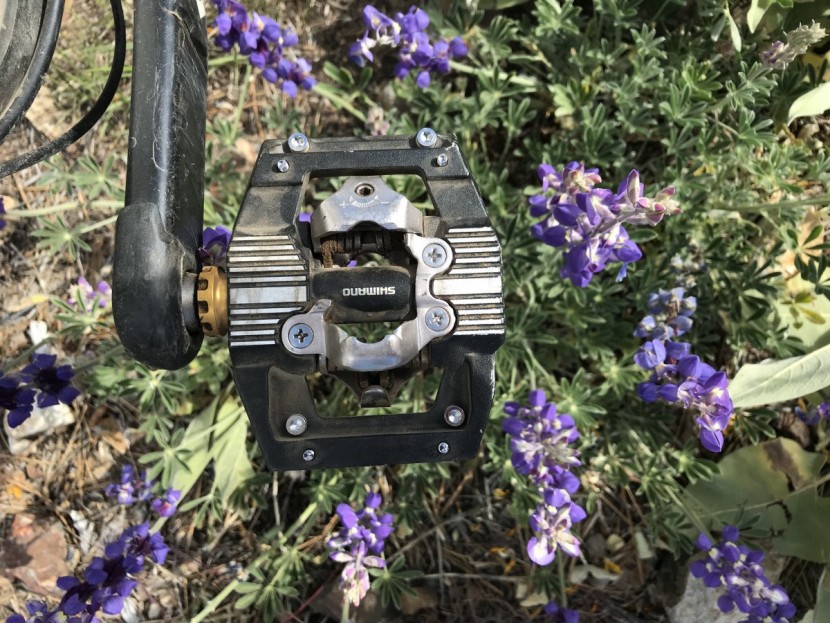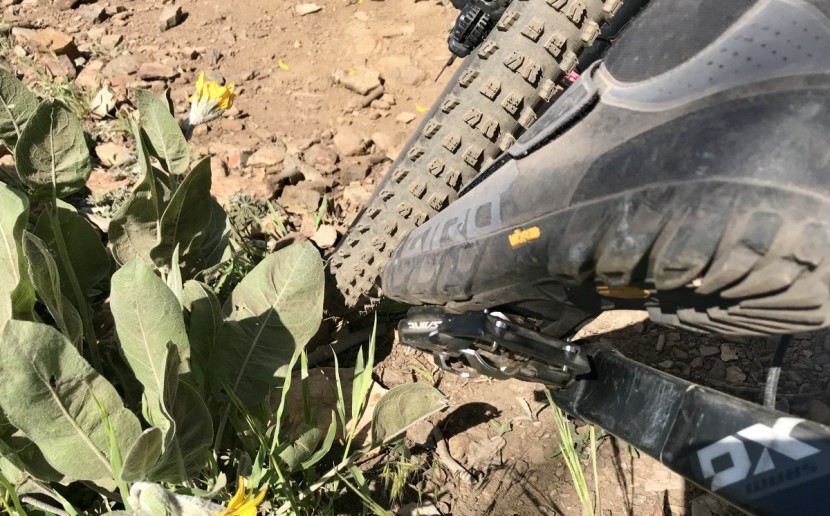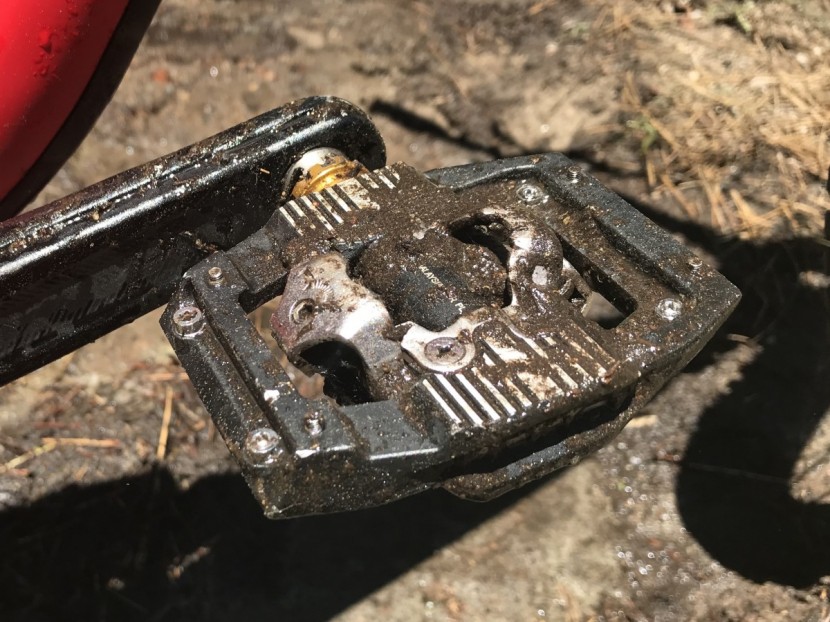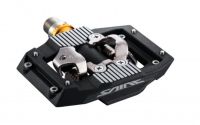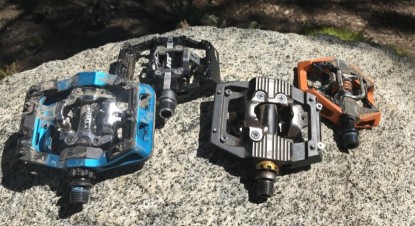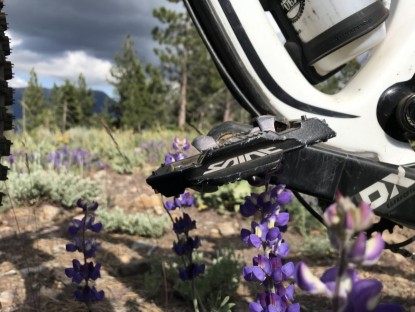
Our Verdict
Our Analysis and Test Results
Shimano recently updated the Saint M820 pedals, now called the M821. The pedal body, clip mechanism, traction pins, and appearance are identical, although they claim improved axle durability. We expect performance to be unchanged. Both versions are still available, and the price is the same. We're now linking to the M821 in our review.
The Shimano M820 Saint are hefty out of the box. They're heavy, but they're also quite slim, measuring 19mm in the center. The platforms appear particularly wide mid pedal and offer four adjustable traction pins, two fore and two aft on each side of the pedal.
Dual row cup and cone bearings support the high-strength Chromoly steel axle. The bodies are forged, machined, and anodized while the engagement mechanism is the same that we find on the Shimano XT M8120. The lock bushes are anodized gold, giving the pedal that rare bit of flare spotted on a Shimano product.
Ease of Entry
These pedals are among the easiest to engage in our test. The platform feels like a can't-miss size and engagement is what we've come to expect from a Shimano pedal. The traction pins and platform offer only minor interference on the rear of the pedal. Even with the traction pins installed at full length, the entry doesn't feel compromised. Once engaged, however, this pedal feels far more substantial than any previous iteration of the SPD.
In dry conditions we thought the DMR V-Twin was easier to get into due to its highly polished clipless mechanism, earning it the highest ease of entry score. Even with its (somewhat dull) 7 pins per side, the engagement was slick and effortless. Read on to see how that slick engagement holds up in the mud.
Ease of Exit
The Saint M820 offers predictable SPD release with no appreciable hang-ups on the traction pins. Due to the platform's width, you're not jettisoned off the side when you unclip, which we appreciate.
The DMR V-Twin releases the cleat with less force, but its platform isn't quite as tacky as the Shimano pedal. While the Saint offers a strong audible confirmation, the DMR sounds a bit more subtle and requires less effort to release.
Adjustability
The Saint is very adjustable, and we score it accordingly. But it's no match for the DMR V-Twin in this metric. The DMR features all the adjustment options of the Shimano pedal and nylon bumpers that can be raised and lowered using steel shims. Those bumpers can be used with or without traction pins to customize their feel. The steel shims used on the DMR come with a serious weight penalty, but we address that elsewhere.
Like other Shimano SPD pedals, the Saint M820 pedals feature adjustable release tension, which you can adjust using a 3mm allen key on either side of the pedal. To ensure equal tension, adjust all four (1 on each side of each pedal) equally. To do this, twist each as far as you can go in one direction and then work backward, counting the clicks as you go. These have 20 clicks, or detents.
Traction pins, if installed without washers, protrude 3mm. You can also decrease the pin height to approximately 1mm or 2mm by using the included 1mm or 2mm washers. The pedals are installed using an 8mm allen key. The Chromoly axle does not have a 15mm wrench slot.
Weight
At 550 grams, the Saint pedal isn't for the rider counting grams or wanting the uphill edge. The pedals pack in a sizable platform, adjustable traction pins, and adjustable release tension, so it's not surprising that they're heavy. And, to increase durability, Shimano uses a forged aluminum pedal body, which is significantly stronger than using cast or extruded aluminum.
Weighing in at almost double a set of CrankBrothers Eggbeaters, however, means we're expecting a big bump in performance. To put that in perspective, the Saint pedals weigh 130 grams more than the Crankbrothers Mallet E and 81 grams more than the Xpedo GFX. With the shims installed on the DMR pedals, they weigh an astounding 610 grams! As substantial as they are, if you're pushing your limits on the downhill or don't spend much time pedaling back up, they're probably worth it.
Platform
Substance! It's a feeling like getting on wide skis for the first time — big, bad, and bold. They're heavy, but the ride is so stable and confidence-inspiring that it feels worth the trade-off. Stepping back on a smaller platform pedal after riding the Saint really drove home how much surface contact has an impact on grip and feel.
Sporting four traction pins per side, the Saint's pins don't interface with the shoe the way most others do. The forefoot pins, even at full length, are minimally engaged on any of our test shoes. Instead, these pins function to grab the shoe and level the pedal for engagement.
Mud Shedding
A mud-shedding pedal is a serious attribute as mud accumulation can render your pedal/shoe interface, and thus your bike, useless. We test this one on wet rides in the real world, including by creating a big mud pit. The kids love it.
The way this pedal feels in the mud reminds us of the Shimano XT M8120 despite the wide interface between the pedal platform and sole. That's a good thing. The pedal body sports machined grooves to help the shoe grip in wet conditions. The grooves also help clear the mud and debris that accumulates between them.
Value
Shimano offers some great value on SPD pedals, and the Saint pedals are no exception. At their retail price, the Saint undercuts a fair amount of their competition. With durability and reliability being hallmarks of SPD pedals, we think they're an exceptional value.
Conclusion
Do you value control above weight? Our opinions have changed over the years, and while we once thought we'd be riding 5lb mountain bikes by now, none of us are disappointed in the performance of today's superbikes. For every weight-saving innovation in cycling we've had, there's been another that enhanced performance, control, or safety. These pedals are solid, stable, and reliable. It's not without some pause that we bolt on a new part that's a couple of hundred grams heavier than the one it's replacing, but these feel worth it.
| Awards | Best for Enduro and Downhill Riding |
|---|---|
| Price | $195 List Check Amazon (on sale!) |
Overall Score  |
|
| Star Rating | |
| Bottom Line | A big step up in stability and traction, we find them worth their extra weight |
| Pros | Stable, great power transfer, excellent traction while engaged, inexpensive |
| Cons | Heavy, sharp pins are a hazard to everything but your shoe |
| Rating Categories | Shimano Saint SPD M820 |
| Ease of Exit (25%) | |
| Ease of Entry (20%) | |
| Adjustability (20%) | |
| Weight (15%) | |
| Platform (10%) | |
| Mud Shedding Ability (10%) | |
| Specifications | Shimano Saint SPD M820 |
| Weight per Pair (grams) | 550g |
| Weight of Cleats and Bolts (grams) | 51g |
| Cleat Type | SPD mountain |
| Style | mini-cage |
| Platform Dimensions (lxw) | 100 x 79mm |
| profile height | 19mm |
| Stance | 57mm |
| Total Width from Crank Arm | 95mm |
| Entry | 2-sided |
| Adjustable Tension | yes |
| Traction Pins | 4/side |
| Bearings | dual angular contact, metal retainer |
| Cage Material | forged and machined aluminum |
| Pedal Wrench Type | 8mm allen |


